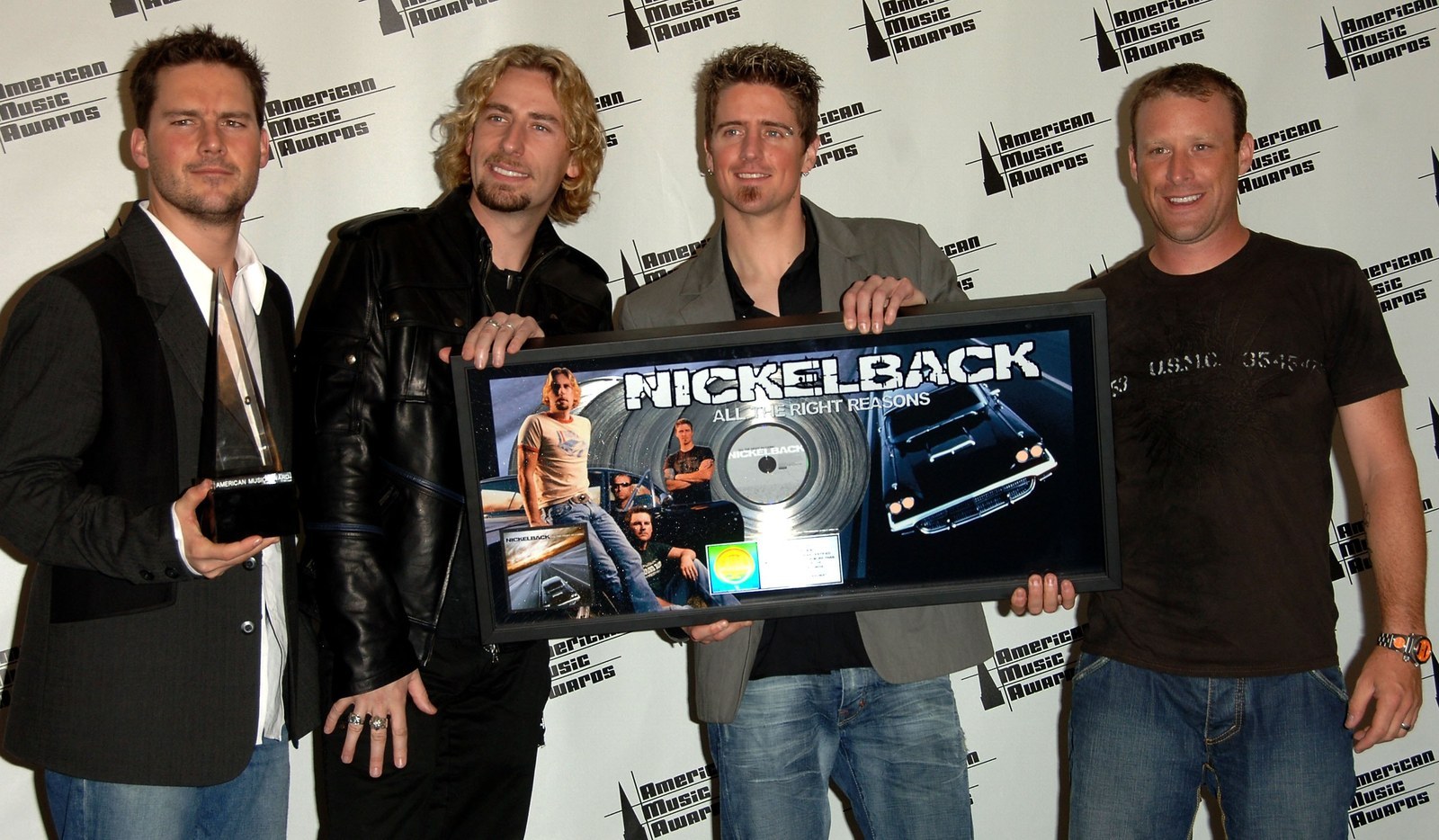
The fastest way to turn a room of people against you once you’re handed the aux cable for your iPod is by playing Nickelback. Specifically, play Nickelback’s “How You Remind Me.” A near-inexplicable rage washes over the faces of the people you thought were your friends as vocalist Chad Kroeger wails, “Never made it as a wise man.” You might not live to hear the second line.
There’s something about the Alberta-based band that causes this rage. They’re hardly the first band to be hated so universally — Limp Bizkit? Hootie And The Blow Fish? — but Nickelback has earned a type of hatred so potent it’s hard to fathom what they did that was so terrible to the public consciousness.
Nickelback started out as a mid-90s cover band in Alberta, because of course they did. They recorded their first album of original songs, Curb, in 1996. When Curb came out, the band consisted of Chad Kroeger and his two brothers Mike (bass) and Brandon (drums), as well as Ryan Peake on guitar.
Curb was not a good record by any measure. It was messy and it was disorganized, raw and disheveled. Still, it had an energy and a determination that would draw at least a couple of A&Rs into the band’s orbit.
By 1998, the band lost Brandon Kroeger, found a new drummer, and independently put out its second album, The State. This album was a good capstone to the post-grunge era. It was unpolished and anxious, loud and paranoid. You would be hard-pressed to say it was a great album, but you couldn’t deny that it was interesting. Interesting enough, at least, that it landed Nickelback a major label deal with Roadrunner Records.
The songs on the album didn’t reinvent the post-grunge wheel: They sang about distrust and drama, about lacking a sure-footing. Musically, it sounded like the angst of the late 90s. Here it mirrors Bush; there, it imitates The Foo Fighters.
Its lead single, “Leader of Men,” is to date the most serious song Nickelback has ever recorded. It’s a song about insecurity for a period marked by doubt. It’s also a testament to a time when Kroeger and company were on the path to something compelling — an investigation, maybe, of their own flaws. “I am not a leader of men,” sings Kroeger, “since I prefer to follow.”
Interesting ideas flicked on and off through the rest of The State. There’s the anxiety of “Breathe.” The aggression of “Worthy To Say.” The album showed tremendous growth over its predecessor – enough to earn the group a Best New Group win at the March 2001 Juno Awards.

On September 11th 2001 (yikes), Nickelback released its third record, Silver Side Up. It was fine. Really, it was fine! It built on the sound of The State, but wasn't a tremendous break from it. By all accounts, there’s nothing remarkable about this album. Except it had this one little song.
It’s difficult to overstate how ubiquitous “How You Remind Me” really was. I get mad just thinking about it.
It’s a power-ballad about breakups, as power-ballads tend to be, but one that radio couldn’t get enough of. It was crowned the most played song of 2002. Some time later, it was named the most played song of the decade by Nielsen Soundscan. Since its release in 2001 until the end of 2009, the damned thing was played 1.2 million times on American radio.
It was a fucking monster.
On its own merits, it’s actually hard to hate the song. It’s a straightforward, well-written pop rock tune, and it happened to become a hit. On the strength of that single, Silver Side Up sold 800,000 copies in Canada, 6 million copies in the U.S., and another million in the U.K.
Then the song became too big. It never stopped playing. It was everywhere. Its legacy is that it introduced people to Nickelback. In doing so, it became a signpost — a specific moment in time when you met the thing you hate. Now, it's hated by association.
Its real impact on Nickelback’s career didn’t become clear for a few more years. But when it finally did, it was undeniable: The band would soon become a parody of itself.

If the opening line “Never made it as a wise man…” is enough to make a crowd of people see red, things were about to get worse. Two years after Silver Side Up, Nickelback released its fourth album, The Long Road. Their first single from the album was — and you probably know this even if you think you don’t — “Someday.”
The Long Road is sincerely forgettable, save for a brash cover of Elton John’s “Saturday Night’s Alright For Fighting,” and, well, “Someday.”
Look, “Someday” isn’t good but it’s notable for one thing: it sounds like Kroeger went back to the same well that gave him “How You Remind Me.” He must’ve deconstructed the song and put it back together. There can’t be another explanation for it: The songs are basically the same. Maybe Kroeger was fascinated by the success of his first hit and was testing out whether he could do it again.
Soon after the song’s release, an Alberta college student named Mikey Smith noticed the similarities between the two songs, and one of the earliest Nickelback memes was born: “How You Remind Me of Someday.”
It was a simple idea, a mashup of the slightly adjusted songs, with each one playing out of a different audio channel. The results are astonishing: The two songs line up so perfectly, rising and falling in the same spots to a near-identical chord progression.
And by God it worked. “Someday” carried the album to three million sales in the U.S. and another 500,000 in Canada. Nickelback were officially bankable. Then they became the band that everyone hated.

If you wanted to pinpoint the time Nickelback became the enemy of music critics, it would have to be in 2005. The release of All The Right Reasons marked the moment any remnants of sincerity left the band’s sound. Authenticity was abandoned for a new identity as rock radio sultans. Nickelback was now in the business of making hits.
The album had 11 songs, but it spawned a bonkers seven singles, each one bigger than the last. Seven singles. It lead with “Photograph.” It had the indistinguishable duo “Far Away” and “Savin’ Me.” It gave us the saccharine “If Everyone Cared.” Of course you recognize all of those titles. The singles from this album kept radio well-fed for a year and a half.
If this wasn’t enough for you, Reasons gave us the band’s simultaneously most critically panned and most commercially successful song ever, “Rockstar.” The song became emblematic of the battle over Nickelback’s standing. Either this song is ironic and good, or it’s tired and boring. Regardless of where you stand, this band raked in money. Reasons went on to sell a stunning eight million copies in the U.S. And the rest is kind of a blur.
When petitions to stop the band from playing pop up — and they do all the time — this is the Nickelback they rail against: A derivative of a derivative, an uninspired hit factory, somehow with enough popularity to fill arenas. It's enough to irk the most open-minded music lover.
The New York Times called Reasons “sullen”; Rolling Stone wrote that its “wordy hooks and big riffs are as meticulously arranged as a thousand-dollar Nativity scene.” In other words, artistically, there’s nothing here.
Patrick Carney, the drummer for the Black Keys, created a small controversy when he told Rolling Stone that, “Rock and roll is dying because people became okay with Nickelback being the biggest band in the world.” It’s a heavy diss, to be sure, and later he walked it halfway back by saying “there’s much worse bands than Nickelback, maybe.”
Whatever the hell his retraction meant is irrelevant. The first bit is much more interesting. In his statement, he suggested that letting Nickelback carry the rock and roll banner was a mistake. That’s not an especially new argument; nor is it interesting. But it is dramatic.
Nickelback now represent the antithesis of the spirit of rock and roll. Whatever fire burned within Kroeger and his bandmates, it has long been extinguished. The album that gave them their biggest success to date reflected none of the neuroses that made The State interesting. They’d never again return to the inspired stumbling that made their early work compelling.
After striking gold with Reasons, the next three (or is it four? Or two? No, three) albums became variations on a theme of radio-friendly pop hits so forgettable they blend into each other. Quick: What album is “If Today Was Your Last Day” from? 2008’s Dark Horse? Or 2011’s Here And Now? How about “When We Stand Together”? Did you even know these were different songs?
It doesn’t matter. Redemption was now beyond this band.

Nickelback started as a cover band, and in a tragic way, became one again. Since 2005, the band has been reliving “How You Remind Me” in new forms, content to recreate it a thousand times in the form of digestible nothing. Incredibly radio-friendly nothing. If this were the 90s, you might say they “sold out.”
“Selling out” isn’t an original insult, but it is a damning one, a signifier of trading whatever was interesting about you in favour of success. There’s an important distinction to be made. The sell out isn’t in making pop hits — that’s its own art form. It’s in deliberately suppressing an urge for originality in order to make what will sell.
The uncertainty that drove Nickelback to make The State faded over time. They were never good, but at some point Nickelback had life. That’s worth remembering, and frankly, also worth mourning.


